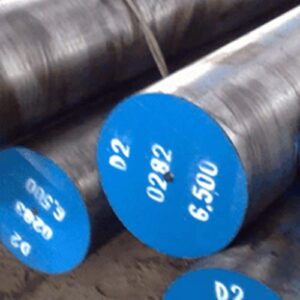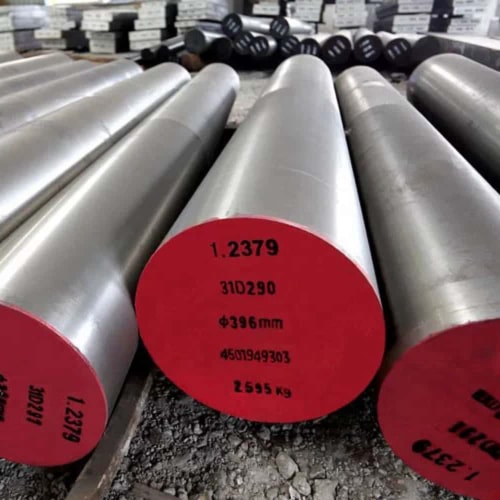Introduction

In the world of tool steels, D2 is renowned for its exceptional properties in cutting tools and industrial applications. This blog explores the intricate chemistry that defines D2 tool steel composition, highlighting its key elements and their role in shaping its performance.
What is D2 Tool Steel?
D2 tool steel is a high-carbon, high-chromium steel known for its excellent wear resistance and toughness. It belongs to the cold-work tool steel category and is widely used in manufacturing dies and punches.
D2 Tool Steel Composition
The composition of D2 tool steel plays a crucial role in determining its mechanical properties. Here’s a breakdown of its key elements:
| Element | Percentage by Weight |
|---|---|
| Carbon (C) | 1.40-1.60% |
| Chromium (Cr) | 11.00-13.00% |
| Molybdenum (Mo) | 0.70-1.20% |
| Vanadium (V) | 0.60% (max) |
The Role of Carbon in D2 Tool Steel
Carbon enhances hardness and wear resistance in D2 tool steel. Its optimal percentage ensures the steel can be hardened effectively during heat treatment.
Chromium: Corrosion Resistance and More
Chromium significantly contributes to D2 steel’s corrosion resistance and edge retention capabilities. Understanding its role is key to leveraging D2 in harsh environments.
Molybdenum and Vanadium: Strengthening Agents
Molybdenum and vanadium contribute to the toughness and wear resistance of D2 tool steel. Their synergistic effects with other elements make D2 suitable for demanding applications.
Applications of D2 Tool Steel
D2 tool steel finds applications in various industries, including:
- Cutting Tools: D2 tool steel’s exceptional hardness and wear resistance make it ideal for cutting tools that require prolonged use without significant wear. Its ability to maintain sharp edges even under high mechanical stress ensures precision and efficiency in cutting operations, whether in machining, woodworking, or industrial fabrication. Tool manufacturers and engineers often choose D2 for its reliability and consistent performance, especially in demanding environments where tool wear and durability are critical factors.
- Cold Work Applications: In cold work applications, where tools operate at room temperature or slightly elevated temperatures, D2 tool steel excels due to its excellent dimensional stability and toughness. It withstands the repetitive stress and impact typical of forming and cutting operations, maintaining its shape and edge integrity over prolonged use. Whether in stamping, blanking, or bending operations, D2’s resistance to deformation and wear ensures reliable performance, reducing downtime and tool replacement costs for manufacturers.
- Industrial Knives: Industrial knives made from D2 tool steel are prized for their ability to maintain sharpness and edge retention during continuous slicing and shearing tasks. From paper and cardboard processing to food processing and textile industries, D2 knives offer superior cutting performance and longevity. The steel’s high chromium content provides corrosion resistance, crucial for applications where cleanliness and hygiene are paramount. Industrial facilities benefit from D2 knives’ durability and precision, ensuring consistent product quality and operational efficiency.
Mechanical Properties of D2 Tool Steel
The mechanical properties of D2 steel are influenced by its composition and heat treatment. Understanding these properties aids in optimizing performance in specific applications.
Heat Treatment of D2 Tool Steel

Heat treatment transforms D2 tool steel into its final hardened state, affecting its hardness, toughness, and dimensional stability. Here’s a general overview of the heat treatment process:
- Annealing: Softens the steel for easier machining.
- Hardening: Achieves high hardness through rapid quenching.
- Tempering: Enhances toughness and reduces brittleness.
Conclusion
D2 tool steel composition is a delicate balance of carbon, chromium, molybdenum, and vanadium, each contributing unique properties essential for various industrial applications. Understanding its chemistry and mechanical behavior is crucial for maximizing its performance and longevity in tooling and manufacturing.
FAQ
Q: What are the advantages of D2 tool steel?
A: D2 tool steel offers high wear resistance, good toughness, and excellent dimensional stability, making it ideal for cutting tools and dies.
Q: How does D2 tool steel compare to other tool steels like A2 or O1?
A: D2 has higher wear resistance compared to A2 and O1 steels but may be more challenging to machine due to its high hardness.
Q: Can D2 tool steel be welded?
A: Yes, D2 tool steel can be welded using conventional welding techniques, but precautions must be taken to avoid cracking.
This comprehensive exploration of D2 tool steel composition provides insights into its chemical makeup, applications, and performance characteristics. For industries requiring reliable tooling solutions, D2 remains a top choice, thanks to its robust composition and versatile properties.

